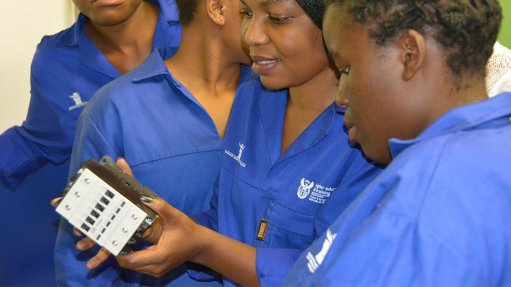Africa sending its best brains to US
Much as I tried, I just could not refrain from having yet another go in this column at US President Donald Trump – he who cannot see anything good that comes out of Africa.
As knowledge of our continent is scant, even among many in our very own Rainbow Nation, most of what he mouths off is taken by many to be the gospel truth. So, taking the advice of American syndicated newspaper columnist and broadcaster Llewellyn King that we columnists should strive to inform our readers, I will share a piece of good news about Africa that Trump pretends not know about. King’s advice was conveyed in a recent piece: “If you can write a column and get any one person to know something they did not know before, then you have probably won. They may not necessarily absorb the whole idea, but they will at least think about [it].”
Despite Trump’s use of expletives to describe African immigrants and those hailing from Haiti and El Salvador, research shows that our brothers and sisters who head for Trumpland in search of greener pastures boast a better education than the natives of that land and immigrants from other regions of the world. One such study, undertaken by the US’s Migration Policy Institute and published in 2017, found that, in 2015, a total of 41% of immigrants originating from sub-Saharan African countries aged 25 and above held at least a bachelor’s degree, compared with 30% of the entire immigrant population and 32% of native Americans. Nigerian and South African immigrants had the highest educational attainment, with 57% of both groups having graduated with a first degree or higher, followed by Kenyans (44%), Ghanaians (40%) and Ethiopians (29%).
What’s more, a study by Washington-based research and advocacy group New American Economy (NAE), which was published in January, found that one-third of the undergraduate degrees were in disciplines such as science, technology, engineering and mathematics (STEM) – skills that are highly sought after, even in the US – and that 16% of the sub-Saharan African immigrants were qualified in medicine, had studied law or held master’s or doctoral degrees. Interestingly, compared with the citizens of other Organisation for Economic Cooperation and Development countries, Americans perform poorly in STEM subjects.
Contrary to what Trump would want us to believe, the NAE report contends that the sub-Saharan African immigrant population “contributes significantly” to the US economy, paying a total of $14.8- billion in federal, state and local government taxes in 2015. They also held about $40.3- billion in spending power, and the report hails what it calls their “outsized role” in the US healthcare sector as “a small but important component of the country’s workforce”.
Because of their high level of English proficiency – 25% speak that language only at home, while only 27% told inter- viewers that they spoke it “less than very well” – sub-Saharan Africans integrate easily into American society. As a result, they have a high participation level in the American workforce, with 75% of them being employed on a full-time basis in 2015, compared with 66% and 62% of foreigners from elsewhere and American citizens respectively. Some immigrants from the region, however, have chosen to become entrepreneurs, with the NAE study finding that, in 2015, about 90 700 ran their own businesses, mostly in the broad transport sector, with real estate and accounting and bookkeeping services also firm favourites. Thus, Africans who choose to make the US their home not only fill gaps in the US workforce but also help create job opportunities for Americans.
Listening to Trump grumbling about Africans immigrating to the US, one would think he has heard that everybody and his cousin is heading for Trumpland. In 2015, the sub-Saharan African immigrant population in the US was only 1.7-million strong. This is a tiny drop in the ocean when viewed against the US’s population of 325.7-million people.
So, Mr Trump, admitting more African immigrants will be of mutual benefit to the immigrants and your great country.
Article Enquiry
Email Article
Save Article
Feedback
To advertise email advertising@creamermedia.co.za or click here
Comments
Press Office
Announcements
What's On
Subscribe to improve your user experience...
Option 1 (equivalent of R125 a month):
Receive a weekly copy of Creamer Media's Engineering News & Mining Weekly magazine
(print copy for those in South Africa and e-magazine for those outside of South Africa)
Receive daily email newsletters
Access to full search results
Access archive of magazine back copies
Access to Projects in Progress
Access to ONE Research Report of your choice in PDF format
Option 2 (equivalent of R375 a month):
All benefits from Option 1
PLUS
Access to Creamer Media's Research Channel Africa for ALL Research Reports, in PDF format, on various industrial and mining sectors
including Electricity; Water; Energy Transition; Hydrogen; Roads, Rail and Ports; Coal; Gold; Platinum; Battery Metals; etc.
Already a subscriber?
Forgotten your password?
Receive weekly copy of Creamer Media's Engineering News & Mining Weekly magazine (print copy for those in South Africa and e-magazine for those outside of South Africa)
➕
Recieve daily email newsletters
➕
Access to full search results
➕
Access archive of magazine back copies
➕
Access to Projects in Progress
➕
Access to ONE Research Report of your choice in PDF format
RESEARCH CHANNEL AFRICA
R4500 (equivalent of R375 a month)
SUBSCRIBEAll benefits from Option 1
➕
Access to Creamer Media's Research Channel Africa for ALL Research Reports on various industrial and mining sectors, in PDF format, including on:
Electricity
➕
Water
➕
Energy Transition
➕
Hydrogen
➕
Roads, Rail and Ports
➕
Coal
➕
Gold
➕
Platinum
➕
Battery Metals
➕
etc.
Receive all benefits from Option 1 or Option 2 delivered to numerous people at your company
➕
Multiple User names and Passwords for simultaneous log-ins
➕
Intranet integration access to all in your organisation


















